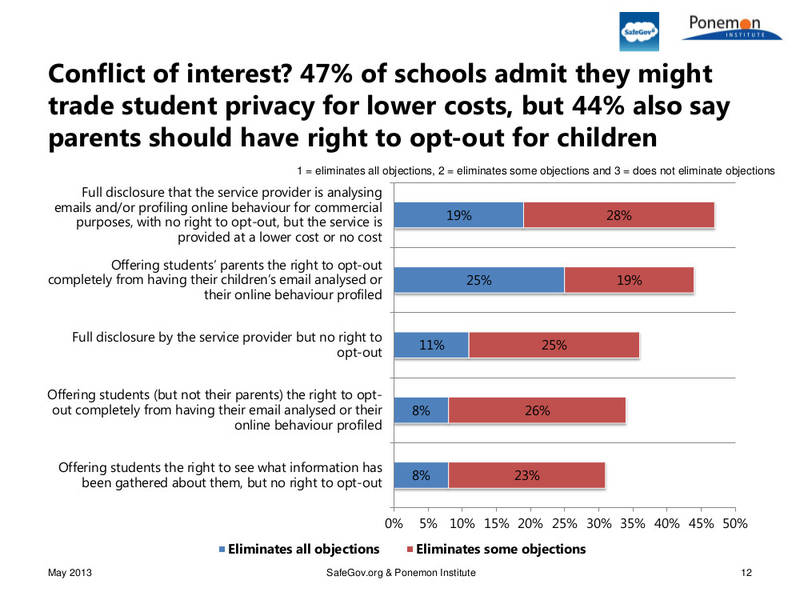Schools and the Cloud ...
Will schools allow students to be profiled and advertised to in the course of their school-day?

Kate says, "Technology companies are moving rapidly to get tools like
email and document creation services into schools. This link to a recent
survey of schools in the UK shows that use of such technology is
expected to bring significant educational and social benefits. However,
it also reveals that schools have deep concerns that providers of these
services will mine student emails, documents or web browsing behaviour
to build profiles for commercial purposes, such as serving
advertisements. When data mining is done for profit, the relationship
between the data miner and the consumer is simply a market transaction.
As long as both parties are free to choose whether and when they wish to
engage in such transactions, there is no reason to forbid them or place
undue obstacles in their path. However, when children are using certain
services at school and can neither consent to, control or even properly
understand the data mining that is taking place, a clear line against
such practices must
be drawn, particularly when their data will be used by businesses to
make a profit."
Schneier: The FBI's new plan to wiretap the internet is great. For criminals.
Bruce Schneier in
Foreign Policy magazine
writes about the new law proposed by the FBI that will make wiretapping the internet
easier. "This law will result in less-secure Internet products and
create a foreign industry in more-secure alternatives. It will impose
costly burdens on affected companies. It will assist totalitarian
governments in spying on their own citizens. And it won't do much to
hinder actual criminals and terrorists."
First looks at Windows 8.1
An incrementally new edition of Microsoft's Windows operating system, the eighth pointh oneth version, launched today.
Mat Honan at Wired has a detailed hands-on, and Wilson Rothman at MSNBC
does a fine job at explaining the new features here.
Teju Cole on Image Search: Google’s Macchia
"Google tried to do everything. It proved itself the deepest and
fastest of the search engines. It stomped the competition in email. It
made a decent showing in image hosting, and a good one in chat. It
stumbled on social, but utterly owned maps. It swallowed libraries whole
and sent tremors across the copyright laws. It knows where you are
right now, and what you’re doing, and what you’ll probably do next. It
added an indelible, funny, loose-limbed and exact verb into the
vocabulary: to google. No one bings or yahoos anything. And it finishes
your sen... All of a sudden, one day, a few years ago, there was Google
Image Search."—
"Google’s Macchia", Teju Cole, The New Inquiry.


No comments:
Post a Comment